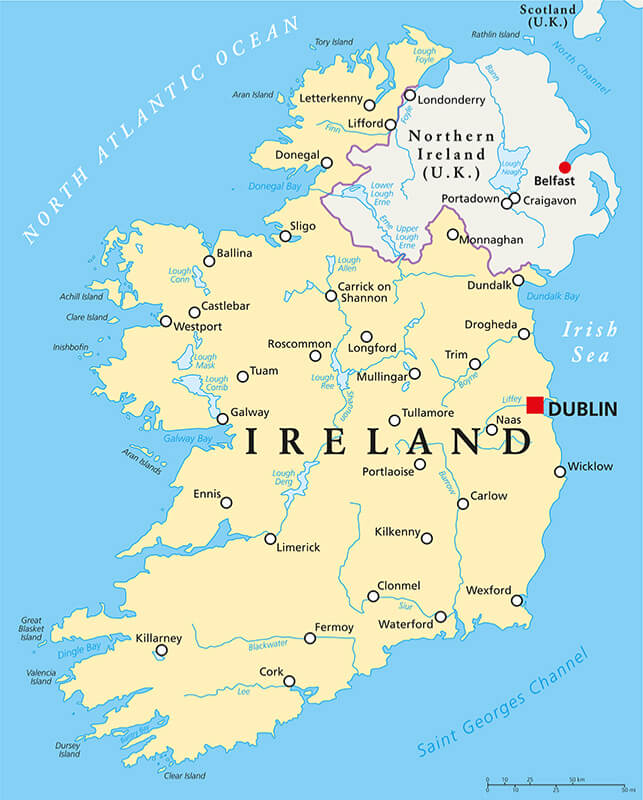Moving to Ireland from the USA: Everything you need to know
Moving to Ireland from the US? This guide covers all the essential information for relocating to Finland as an American, including tips and insights.

Ireland is known for its love of food and drink, picturesque countryside and bustling cities. From the outside, Ireland may look like a perfect place to call home. But moving to a new country is a huge decision. It’s important to do your research and weigh the pros and cons to living in Ireland. Read on to find out more.
Moving to a new country can be daunting, but your banking doesn't have to be! Wise offers a Multi-currency Account which you can set up to send, spend and receive EUR before landing in Ireland.
Wondering: How cold does it get in Ireland? Puzzled by how many people live in Ireland? Let’s look at some facts about life in Ireland before we get to the pros and cons of living in Ireland
| Capital | Dublin |
| Language | English and Irish |
| Population | 5 million |
| Weather | Mild and wet |
| Currency | Euro (EUR or €) |
| Timezone | GMT |
| Government type | Parliamentary republic |
| Religion | Predominantly Roman Catholic |
Ireland is an island in Northwestern Europe, to the west of the UK. Here’s what it looks like on a map:

If you’re a US citizen you won’t need a visa to enter Ireland. However, if you’re planning on staying for over 90 days, or if you’re headed to Ireland to work or study, you’ll need to register and make sure you have the correct permit to cover your stay.
Irish visas and permits are normally issued as either long or short term passes, on the basis of employment, study or family reunification. There are also specific programs to live in Ireland as an investor or a retiree.
The Immigrant Investor Program (IIP) is a good option for high net worth individuals who are planning on moving to Ireland. Under this scheme, individuals must make investments in approved funds or trusts, from 1 million euros. Alternatively you can donate 500,000 EUR or more to a project in the arts, sport, health, culture or education¹.
Another option is to apply for residence in Ireland on the basis of family ties to the country. Applicants tend to have an Irish parent, grandparent or great grandparent.
You’ll usually need to apply for the visa or permit you need at your local Irish embassy or consulate before you leave the US.
Let’s dive into some of the many reasons Ireland deserves consideration from expats looking for a new home:
Ireland is one of the closest European countries to the US and Canada. It’s also a fantastic launching point for exploring the rest of Europe — the UK is less than an hour away, Barcelona is only a two hour flight and Rome is only three hours. For world travelers, there’s hardly a better home base anywhere than Ireland.
Ireland is an international hub — in part thanks to its geographic location, but also because of its close historical and cultural ties to both Europe, the UK and the US.
As English is an official language, it’s a relatively straightforward place to live, study and work for English speakers. In fact, something in the region of 650,000 foreigners live in Ireland — from a total population of about 5 million people.
Ireland has some pretty strict gun laws — and with around 7 civilian firearms per 100 people, a very low rate of gun ownership compared to many countries. This means that rates of gun violence are nearly nonexistent and rates of violent crime overall are low in Ireland. It’s a pretty safe place to call home.
All permanent residents in Ireland are entitled to healthcare. Healthcare is offered on a government funded basis although you may still have to pay out of pocket for some services like doctor’s visits.
Various schemes are in place to help people manage the costs of chronic or long-term conditions and cap the amount you have to spend on prescription medications.
Residents of Ireland can be dual citizens with another nation, as long as that nation also recognizes the ability to hold a dual citizenship. That means becoming an Irish citizen doesn’t necessarily mean you have to give up your rights in your home country.
| Read more about dual citizenship here |
|---|
In Ireland, even non-residents can open bank accounts with a valid form of photo ID (like your passport) and a proof of address. Unfortunately, bank accounts in Ireland can rarely be opened online, so you’ll have to wait until you’re actually in the country to take care of this chore.
There are some important things that you may need to pay for before you arrive, such as paying a deposit for an apartment. In this case, an international account, such as Wise, might be a good option.
With Wise you can hold, send and receive money in EUR and many other currencies, even before leaving the US. You’ll also get the mid-market exchange rate — the one you see on Google — for every conversion or international transaction.
Set up a Wise account in minutes 🚀
In Ireland’s larger cities, like Dublin, public transportation is generally pretty fast and reliable, though there are delays sometimes in the larger systems. Outside the cities, there are buses and trains that will take you just about anywhere, and for the places they don’t go, rental cars are cheap.
Ireland is known around the world for its pub scene. Pubs are more to the Irish than places to have a meal and a Guinness — they’re like community centers where people make and keep friends, play games, hear music and more. The social scene in Ireland is lively, and definitely revolves around time spent in pubs, which is great news for those who like to eat and drink.
Unfortunately, no place is perfect, and that includes Ireland. Just like in any other country, there are some cons to living in Ireland, such as:
Ireland is well known for being dreary and rainy almost year-round. It’s what earns it its title the Emerald Isle but it’s also unpredictable, meaning you might see sunny skies and a downpour of rain within the same day (or even the same afternoon!).
It rarely snows in Ireland, but that doesn’t mean much of the year isn’t cold. If you’re someone who needs steady sunshine to be happy, Ireland may not be for you.
The cost of living in city centers of Ireland’s bigger metropolitan areas can get pretty steep. Rents are much lower as you get further from the city centers, but those areas have less access to public transportation.
The Irish love their pubs, and to many that’s a draw for the country. But the social scene revolves pretty heavily around alcohol — which may be a turn off if you don’t drink.
All that said, the Irish government is putting plenty of resources into promoting responsible behavior around alcohol, and in recent years sober venues — including sober pubs — have opened up, too.
Irish fuel taxes are very high at over 50%, which drives up the cost of gas. While prices vary by location, you can expect to pay double the amount to fill up in Ireland compared to the US. And drivers don’t save by going across the border into the UK to fill up — fuel is expensive there, too.
House prices in Ireland went up by an average of over 10% in 2021² — and are forecast to continue growing due to a shortage of housing supply. The supply shortage also impacts rental prices, which are relatively high in cities.
Getting a mortgage loan in Ireland is hard — and it’s generally even harder for expats to qualify. Foreign residents in Ireland are often seen as higher risk borrowers, and offered pretty poor interest rates even when they do qualify. If you’re planning to buy property instead of renting, you may have a lot of work ahead of you to secure a home loan.
| Looking for a mortgage to buy property abroad? Check our handy guide on getting a mortgage for overseas property |
|---|
Ok, so now that we’ve been through the pros and cons, you might be wondering should I move to Ireland? If the answer is still not certain, here are some more aspects for you to consider:
Wherever in Ireland you decide to move to — and whatever you enjoy doing, life in Ireland is likely to be a little different to what you’re used to in the US.
Typically Ireland offers a better work life balance than many countries, with shorter working hours and a reasonable level of vacation offered by employers. The Irish are also famously talkative — so expect colleagues, classmates and even passers by to take a genuine interest in getting to know you.
However, compared to the US many of the costs of living are higher in Ireland, and — as many American expats in Ireland point out — the Irish climate can also be a bit of a shock to new arrivals.
Getting excited about moving to Ireland? Let’s look at a few popular expat destinations.

The capital of Ireland, Dublin is home to over half a million people, and large active expat communities. Dublin is a great place for people who come to Ireland to work, as well as being home to Ireland’s top 2 universities — Trinity College Dublin and University College Dublin.
One downside will be finding a home — Dublin’s rental prices are high, with the city found to be the 6th most expensive in the world for renters in 2021³.

Over on the west coast of Ireland, Galway is much smaller than Dublin — and typically has a lower cost of living too. The city is on the ocean, which means great views but frequent rain.
Galway is celebrated as a vibrant and diverse city with great historic and cultural resources which has a lot to offer people looking for a slightly slower pace of life.

Ireland’s second largest city, Cork is in the south of the island. It’s laid back, compact and affordable — and home to some big global companies which also makes it a good bet for people moving to Ireland for work. Cork has a great atmosphere, with frequent tourist visitors and a large student population keeping things lively.
Before you move to a new country, it’s important to do your research so you’re prepared and can hit the ground running when you arrive. Ireland has its downsides, but it has many good qualities as well — take some time to scope out options, plan your move and build a realistic budget to make sure everything goes smoothly.
One of the most important things to decide will be what to do with your money. Read on for great ways to save when you relocate to Ireland.
Send money to Ireland without having to worry about having a markup on the exchange rate.
Wise can be cheaper than banks when making international payments. You’ll always know the fees upfront and get the mid-market exchange rate for every transaction.
Join Wise today and
be without borders 🌎
Starting a new life in a new country is a big deal. It’s a fantastic adventure — but it can also be challenging. The good news is that making the leap to Ireland is relatively easy thanks to a shared language, friendly locals and some great opportunities to work and study.
Those who manage to move from the US to Ireland are rewarded with a great work life balance, beautiful natural scenery to explore, and a great base to carry on your adventure with trips further into Europe. Use this guide as a jumping off point to plan your own relocation — and wherever you end up, good luck with your travels!
Sources:
Sources checked on 03.22.2022
*Please see terms of use and product availability for your region or visit Wise fees and pricing for the most up to date pricing and fee information.
This publication is provided for general information purposes and does not constitute legal, tax or other professional advice from Wise Payments Limited or its subsidiaries and its affiliates, and it is not intended as a substitute for obtaining advice from a financial advisor or any other professional.
We make no representations, warranties or guarantees, whether expressed or implied, that the content in the publication is accurate, complete or up to date.

Moving to Ireland from the US? This guide covers all the essential information for relocating to Finland as an American, including tips and insights.

Interested in buying land in Ireland? Here’s everything you need to know about buying a plot of land abroad as an American.

Thinking about moving to Ireland? Find out what you need to know about renting in Ireland in this guide.

Thinking about buying property in Europe? Your best bet might be Ireland. Learn everything about buying property in Ireland right here.

Child maintenance in Ireland is complicated — read on to learn what you need to know.

Having a baby is a priceless experience, but if you’re a foreigner in a different country, it can be daunting to navigate new healthcare systems and impending...